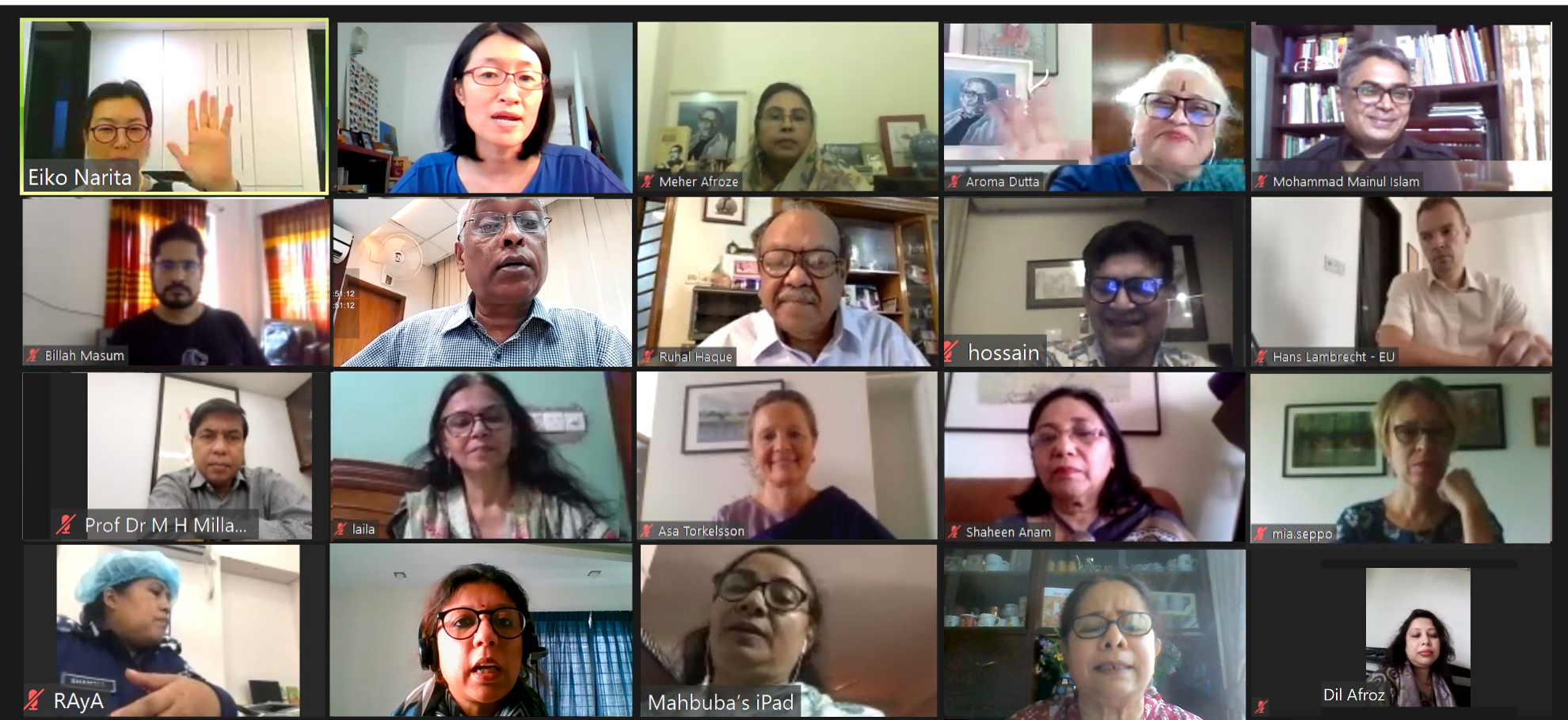(Dhaka, 9 June 2020) - As governments around the world are encouraging their citizens to stay home to halt the spread of COVID19, it is crucial for us to remember that for some, home may not be a safe haven. Unexpected economic hardship or other social stressors are resulting in rising tensions among families, increasing gender-based violence. It is also estimated that harmful practices, such as child marriage, may also increase as families look for easy, yet untenable solutions to their economic desperation.
To find ways to address these issues as Bangladesh combats COVID-19, UNFPA conducted a high-level webinar consultation with law and policymakers, prominent experts, international community, researchers and civil society members to bring about solutions to the burgeoning incidents of gender based violence and child marriage.

The webinar was headlined by a presentation from Member of Parliament and human rights activist, Hon. Aroma Dutta. In her presentation, Hon. Dutta highlighted the need for a collective response from all the stakeholders present, to prevent increases in gender-based violence and child marriage in the context of COVID-19. “It is crucial to have a concerted and coordinated process involving the Members of the Parliament, Members of Local Government along with local administration for a holistic process of effective planning, implementation and monitoring.”, she remarked.
The need for all the stakeholders in the country, including the private sector, to address the risks related to gender-based violence and child marriage during COVID-19 was also emphasized by the United Nations Resident Coordinator in Bangladesh, Ms. Mia Seppo. “As the UN, we will continue to work with everyone and make sure that these multi-stakeholder platforms are available, and that the global attention on gender-based violence turns into actions, undertaken collectively based on evidence,” she said.
The forum aso reflected upon the changing socioeconomic dynamics that may contribute to the rise in gender-based violence and child-marriage. “Situations of shock and crisis have increased harmful practices in the past, especially practices tied to economic pressures such as child marriage and gender-biased violence,” warned the Chairman of the Standing Committee on Ministry of Women and Children Affairs, Ms. Begum Meher Afroze during the discussion. The former Minister of Health and Family Welfare and Member of Parliament, Prof. Dr. AFM Ruhul Haque went on to inform the participants there had already been a discernible rise in gender based violence and child marriage in his constituency.
Health and education were identified as two of the key factors behind the rise of such incidents and multiple participants urged parliamentarians to increase government funding for these sectors during COVID-19. “Sexual and Reproductive Health and Gender Based Violence issues are inherently budget issues, too,” remarked Dr. Hossain Zillur Rahman, BRAC Chairperson and a civil society leader. This was echoed by prominent educationist and social activist Rasheda K Choudhory: “It should not be either or, both health and education should come as priority sectors under the context of COVID-19.”
The panel also discussed how the delivery of services addressing gender-based violence and child marriage has drastically changed amidst the pandemic. Organizations combating the issues have had to mostly resort to digital modes of intervention, which is problematic considering the huge gender digital divide in Bangladesh. Representative of UN Women Bangladesh, Ms. Shoko Ishikawa, highlighted this issue, emphasizing how low-cost technology and increased capacity of women and girls to use those technologies is needed to meet this gap.
The need to invent new ways of working amidst the exceptional conditions created by the pandemic was also emphasized by the Representative of UNFPA Bangladesh, Dr. Asa Torkelsson, during her closing remarks to the webinar. “There are roadblocks. The ways in which we used to work must change according to the current context. Succeeding will require from all of us new ways of working and new innovations. We as UNFPA, are united with all our heart, mind, desire and intent to realize this, and to ensure a safer world for all women and girls, despite the challenges”, she concluded.
The high-level consultation was moderated by Ms. Eiko Narita, Deputy Representative of UNFPA. Participants of the meeting included representatives from the Parliament of Bangladesh, the Ministry of Women and Children Affairs, the Ministry of Health Affairs, the Bangladesh Police, UN agencies, national embassies, non-governmental organizations, development partners, civil society organizations and universities.


